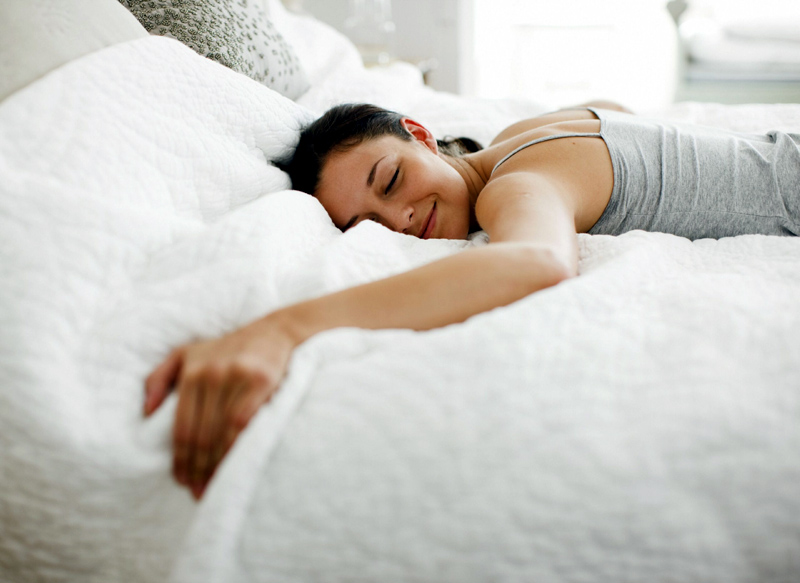![[feature] Tips to Help You Sleep Like a Baby and Wake Up Rested](https://blogger.googleusercontent.com/img/b/R29vZ2xl/AVvXsEgWJ3q2JZGF_ZWQdqum5fkhENOQuaKvUWf8kVbbhIsGxL0U5zHv9CL_xKE-7qTRy5DmpwIwTyJAx-DLsnpvMeqyVcUFLJElBBgJXu2dV0nNafjHNI6c5aYQt6-rNFbhyQCqXuxki0pB_zE3/s1600/autos.dearjulius.com.jpg)
Sleep is an integral part of our lives. It has the ability to affect every aspect of our days, including our energy levels and the ability to handle whatever challenges come our way. Even eating patterns, cravings and metabolism can be affected by our sleep patterns and quality of sleep.
As sleep takes up approximately one-third of your life — or at least it should — sleep quality can literally make or break the other two-thirds. Getting consistent restful sleep should be at the top of everyone's priority list. Start with these helpful tips to get you on the right track for improving your sleep.
Get Some Exercise
 |
| © iStock |
Any exercise, even a 10-minute walk, can benefit your body. The longer you keep up the exercise habit, the more benefits you will see. Try to exercise earlier in the day or at least three to four hours before bedtime.
Kill the Stress
 |
| © Sharon Wright/Unsplash |
Start by determining what stress you have in your life. Make a conscious choice to get away from it, change it or deal with it as best you can. Also, exercises like yoga can help reduce stress while providing the added benefit of exercise.
Avoid Caffeine in the Evening
 |
| © Alina Kovalchuk/Unsplash |
Unfortunately, caffeine can stay in your body for up to 8 hours. Depending on your bedtime, that could mean you need to cut the caffeine as early as 3 p.m. If it’s the warmth or the flavor of coffee you crave, don’t get stressed about it. You can always switch to decaf halfway through your day.
Make Natural Light Your Friend
 |
| © Adeolu Eletu/Unsplash |
You might consider taking a walk outside during your lunch break, for example. If it’s simply not possible, then find a lamp or bulbs that are as close to natural light as possible. This will still provide some of the health and mental benefits of light, although natural light is always best.
Eat Early in the Evening
 |
| © Ivan Gener/Stocksy |
Try to finish any meals at least a few hours before you get ready for bed. If you need a snack, that’s fine. Just don’t eat anything big or heavy right before you try to sleep. Stop as soon as your hunger is satisfied, as opposed to automatically eating a full snack.
Wake Up at the Same Time Every Day
 |
| © Erik Isakson/ Getty Images |
Start preparing for bed earlier than that time to give your body a chance to unwind. Wake up at the same time every day, even when you don’t need to get up that early, so your body can maintain a consistent sleep schedule.
Avoid Alcohol
 |
| © Shutterstock |
In fact, as alcohol reduces the amount of melatonin the body produces, you are more likely to nap when you drink instead of actually sleeping appropriately. When you do fall asleep, you will most likely snore and have other sleep-disrupting problems.
Get a Good Mattress
 |
| © Daly and Newton/OJO Images/Getty Images |
A quality mattress can help you fall asleep quicker, rest better and wake refreshed and without pain. Look for a mattress that conforms to your body as opposed to your body having to conform to it. Mattresses with either memory foam or interlocking coils are good options.
Keep Naps Short
 |
| © Kazuky Akayashi/Unsplash |
Some people can nap during the day and still have no trouble falling asleep at night. If you do have a hard time sleeping at night after taking naps, try reducing naptime to between 30 and 90 minutes. Also, try not to take naps after 3 p.m.
Mind Your Bedroom Temp

Everyone has their favorite temperature setting, but most people find their optimal sleeping temp to be somewhere between 68 degrees and 72 degrees. Try adjusting the temperature for a few nights until you find what works best for you.
Clear Your Mind
 |
| © Adobe Stock |
One of the best things you can do is keep a notepad and a journal beside your bed. Before you lie down, write down anything that’s on your mind. If you wake up in the middle of the night with an important thought, write it down quickly and then go right back to sleep.
Create a Bedtime Routine

Also, write out your to-do list for the next day during your bedtime routine to help clear your mind. Laying out your clothes for the next day before you go to bed can help too, so you won’t find yourself worrying about it while you’re trying to go to sleep.
Establish a Daily and Weekly Routine

If this is your routine, you don't have to lie awake, reminding yourself to make a list or wondering when you will go shopping. Establish a daily and weekly routine for your sanity as well as for the benefit of falling asleep without distractions.
Try Some Melatonin

One of the great things about melatonin is that unlike many sleeping pills, it doesn’t completely knock you out. It lulls you into a gentle sleep that you can easily wake from if an emergency occurs in the middle of the night or you have children who might need you.
Work with Your Body's Natural Rhythms
 |
| © Kinga Cichewicz/Unsplash |
Suddenly, your brain is telling your body to produce melatonin — the sleep-inducing hormone, remember? — during the day. If this happens to you, start by resetting your body to its natural rhythms. Once your body knows that it’s night and you need to sleep, it will become much easier to make it happen.
Try Some Nighttime Yoga

If you aren’t familiar with yoga or you’re simply not sure what is good for nighttime, plenty of videos are available on YouTube. Be sure to type in "bedtime yoga" or "nighttime yoga" to get clips with the relaxing exercises instead of the heart-pumping workouts.
Spend More Time Outside During the Day
 |
| © Christopher Burns/Unsplash |
It’s important to be exposed to bright light during the day. As previously discussed, our bodies have natural rhythms, and light affects those rhythms. If you want to reset them, spending time outside during the day is a great way to start.
By going outdoors when the sun is out, you take in vitamins and nutrients from the sun, which will improve your energy levels. The fresh air does the body good as well. At the very least, keep your curtains or blinds open during the day to reap some of the benefits the entire time the sun is up.
Dim the Interior Lights

If you have work or school work to do, don’t turn the lights down to the point of straining your eyes. Instead, set a timer for when you need to stop working, and then dim the lights.
Protect the Sanctity of Your Bedroom
 |
| © Russell Palin |
This is hard for people whose bedroom doubles as a home office. If that is a necessity in your home, at least try to keep your office out of view of the bed. You can do this either by moving it to another spot in your room or putting up a partition.
Stay Away from Blue Light

Multiple apps can block the blue light on your devices. You could also consider purchasing glasses that do the same thing. It’s also best to turn off the TV and put away the devices at least a couple of hours before bedtime. Instead, spend some quality time with your family.
Keep the Room Dark for Sleep
 |
| © ruigsantos/Shutterstock |
Lights are not really conducive to a restful environment, so the darker you can keep your bedroom, the better. For those who work at night and sleep during the day — or simply need to keep a light on — there are some other very effective options.
Sleep masks are very helpful for blocking out light while you sleep. Another option is to buy blackout curtains, which block out the sun entirely. Regardless of which option you try, aim for the darkest sleep environment you can possibly imagine.
Skip the Scary Movies
 |
| © britishcouncil.org |
Neither of those things will allow you to relax enough to sleep well. If you watch something scary before bed, try to do some calming exercises afterward. There is no guarantee that they will keep the movie off your mind and restore your blood pressure, but it’s worth a shot.
Eat the Right Bedtime Snack
 |
| © Freestocks.org/Unsplash |
Instead, choose something that is easily digestible and healthy. Some common suggestions include half of a turkey sandwich, a cup of yogurt, bananas or a small bowl of whole grain cereal, like Cheerios and milk.
Keep Your Phone Out of Bed
 |
| © Daniel Apodaca/Unsplash |
Second, allowing things such as cell phones and tablets in your bed sends your brain the message that it’s okay to work in your bed. That could lead to subconscious interference in your body’s ability to recognize that it’s time to sleep when you crawl in bed. Your bedroom, especially the bed, should be used for only sleep and romance.
Try a Sleep-Promoting App
 |
| © Trinette Reed/Stocksy |
Take a look at the Android and iPhone app stores, depending on your device. It may take some trial and error, but you can probably find one that works well for you. Of course, be sure to cover your phone so the light (if any) doesn’t interfere with your sleep.
Learn Relaxation Techniques

Little by little, tighten and then let go of each muscle group. By the time you work from your head down to your toes, you should be incredibly relaxed. If not, simply start again, working from bottom to top but moving more slowly this time.
Choose the Right Pillow
 |
| © Anastasia Dulgier/Unsplash |
Depending on whether you’re a side sleeper, back sleeper or stomach sleeper, you can find a specialized pillow for that position. When you’re purchasing your pillow and mattress, look for a weighted blanket, as well, which gives the user an added sense of security when sleeping.
Drink Some Warm Milk or Chamomile Tea

No matter what you choose to drink before bed, be sure you don’t drink too much. It’s no fun to be warm, relaxed and finally sleeping, only to be rudely awakened by a full bladder.
Get Healthy

Strive to be as healthy as you can by not only eating well and exercising, but also brushing your teeth twice a day, taking a multivitamin, journaling and seeking therapy if you need it. The healthier you are, the longer you can enjoy a restful sleep.
Seek Professional Help

If you have tried everything on this list and nothing helps, it may be time to see a professional. They can often pinpoint anything mental that is affecting your sleep and help you find a way to fix the problem.





















